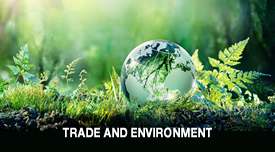 Historically, fish is the most traded food animal protein worldwide in value terms. World trade flow in fisheries and fisheries products shows a consistent supply trend from developing to developed countries. Small-scale and artisanal fishers play a significant role in developing countries in producing fish and fishery products.
Historically, fish is the most traded food animal protein worldwide in value terms. World trade flow in fisheries and fisheries products shows a consistent supply trend from developing to developed countries. Small-scale and artisanal fishers play a significant role in developing countries in producing fish and fishery products.
A close examination of fisheries trade delineates the challenges of market access facing small and medium fishers, including artisanal, particularly from a developing countries’ perspective. The livelihoods of 90 percent of the 120 million employed in fisheries are in the small-scale fisheries, and almost all of those workers, 97 percent, live in developing countries. About half of those working in the fisheries sector are women, mostly engaged in marketing and processing. Many small-scale fishing communities have high levels of poverty, and fish provides vital nutrition to billions of people and is essential to the diet of the poor.
However, a variety of trade policy tools, including tariffs and subsidies, and non-tariff measures, such as food safety, technical and sustainability standards, have a significant influence in shaping fisheries production and trade, particularly in defining the actors enabled to access markets in developed countries. While many of these measures are in place due to legitimate objectives, in practice their implementation can lead to technical or financial obstacles, as well as restrictions on market access. These challenges are especially true when considering capacity and knowledge constraints of small and artisanal fishers in developing countries.
Fish products are generally more exposed to non-tariffs measures than industrial manufactures. The reason is the high incidence of sanitary and phytosanitary measures (SPS) measures on agriculture and food products that are usually not applied to manufactures. Based on UNCTAD's NTM database, there are on average about 2.5 times more distinct technical measures applicable per HS codes for fish product and agricultural products than for HS in manufactures. (UNCTAD DITC (2016) based on data from UNCTAD's TRAINS database). These measures may disproportionally affect market access prospects of fish products by small scale fishermen than of large scale industrial fleets.
The session will present an overview of the production of fisheries and fisheries products, highlighting the importance of this economic activity for developing countries and small-scale and artisanal fishers. The session will specifically focus on the key problems faced by small-scale and artisanal fishers in accessing international markets, as well as how a trading system that is transparent, predictable and governed by the rule of law could positively contribute to providing the necessary foundation to expand and to create market opportunities. Finally, challenges on how to transform any potential for small-scale and artisanal fishers into a reality and to make fish trade more inclusive will be addressed, particularly by reducing information and knowledge gap among all stakeholders.
Fish production is an inclusive animal protein by nature – in trade, no one can be left behind.
Simultaneous interpretation will be provided in English, French, and Spanish.

 Trade and Environment, Climate Change and Sustainable Development Branch
Trade and Environment, Climate Change and Sustainable Development Branchhttp://unctad.org/topic/trade-and-environment
 Public Forum 2017 — “Trade: Behind the Headlines”
Public Forum 2017 — “Trade: Behind the Headlines”https://www.wto.org/english/forums_e/public_forum17_e/public_forum17_e.htm
 FAO-UNCTAD session at the WTO Public Forum 2017–Trade: Behind the Headlines
FAO-UNCTAD session at the WTO Public Forum 2017–Trade: Behind the Headlines Contact
Marcio Castro de Souza, Senior Fishery Officer, Fisheries and Aquaculture Department, marcio.castrodesouza@fao.org
Marco Fugazza, Economic Affairs Officer, TAB/DITC, UNCTAD, marco.fugazza@unctad.org



